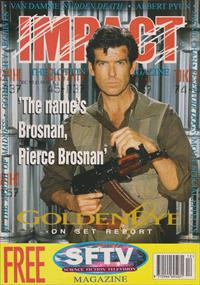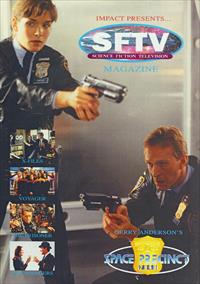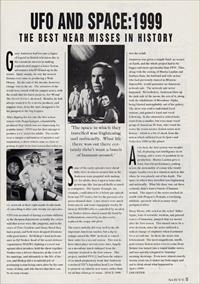Press
Impact SFTV
Impact was a 1990s UK magazine focussed on action films, with a heavy interest in Hong Kong martial arts films. In December 1995 it produced a one-off SFTV supplement, apparently to test the market against established UK science fiction magazines like TV Zone. A slim 18 page magazine, it featured short one or two page articles on Star Trek Voyager, Gerry Anderson's Space Precinct and The X Files. It was edited by Ian Fryer, who has written extensively on Gerry Anderson, and is a regular contributor to the fan club Fanderson (in the editorial, Fry dedicates the magazine to Chris Bentley for his Fanderson work).




THE BEST NEAR MISSES IN HISTORY
Gerry Anderson had become a figure of legend in British television due to his enormous success in making sophisticated puppet science fiction adventures which cleaned up in the sixties. Quite simply, he was the nearest Britain ever came to producing a Walt Disney. By the end of the decade, however, change was in the air. The airwaves of the world were awash with his puppet series, with the result that his latest projects, Joe 90 and The Secret Service, drowned. Besides, he had always wanted to be a movie producer, and puppets were, from the start, designed to be his passport to the big leagues.
After dipping his toe into the live action waters with Doppelganger, a beautifully produced flop which was too depressing for popular tastes, UFO was his first attempt to produce a T.V. series for adults. The results were a unique combination of mistakes and inspiration; a show which came so close to getting it right in its first season that today no t.v. network in their right minds would think of cancelling it after only twenty six episodes.
UFO was accused of having a certain stiffness in the thespian department (actually the critics said that actors were like puppets), and in the cases of Peter Gordeno and Harry Baird they had a point, and both were dropped (Gordeno with great haste). Ed Bishop's lead performance as Ed Straker, head of the secret defence organization SHADO, fighting a covert war against alien invaders, held the show together. Straker was a driven character, at the cost of his marriage, and ultimately to the life of his son, and Bishop did a wonderful job of portraying a man being eaten alive by his own sense of duty, and who knows that there can be no easy escape.
Some of the early episodes were dreadfully slow; it seemed that as the Anderson team grappled with making t.v. for adults, they forgot at times that grown-ups like fast paced thrills as much as youngsters. The Square Triangle, for example, could almost be a below-par episode any ITC series, but for the presence of a green-skinned alien. Later stories were much faster paced, and some engagingly wacky SF ideas (a SHADO officer controlled by an alien cat; Straker driven round the bend by hallucinations caused by an alien rock), replaced the soapy sub-plots.
The series initially did very well in the all- important American market, but a dip in ratings caused the NBC network to cancel their order for a second season. This was to have taken place several years later, largely on a moonbase much enlarged from the structure featured in the first season. This project, entitled UFO 2, had been the subject of so much preparatory work that Anderson convinced ITC's legendary head Lew Grade to propose an entirely new series, rather than let all that effort go to waste. SPACE: 1999 was the result.
Anderson was given a simple brief: no scenes on Earth, and the whole project had to be bigger and more spectacular than UFO. This, along with the casting of Martin Landau and Barbara Bain, the husband and wife actors who had previously starred in Mission: Impossible, would guarantee an American network sale. The network sale never happened. Nevertheless, Anderson blew up the dark side of the moon, the rest of it, along with the inhabitants of Moonbase Alpha, being blasted unstoppably out of the galaxy. The show was sold to individual local stations, and gained a loyal and vocal following. It also attracted a critical holocaust from a smaller, but even more vocal group of American SF fans, who voted the series the worst science fiction series in tv history - which is a bit of cheek from the nation which inflicted Lost In Space and Galactica 1980 on the planet.
At its best, the first season was wonderful, displaying real intelligence in its writing, and a sense of grandeur in its production. Martin Landau gave a loud, forceful performance, putting across the personality of a man who would inspire loyalty even in a situation such as this where he was plainly out of his depth. The space in which they travelled was frightening and unfriendly. What life there was out there certainly didn't want a bunch of humans around. This aspect of the series reached its zenith with Dragon 's Domain, a terrifying, nihilistic spectacle which in many ways prefigured Alien.
Barry Morse, who acted as the series' father figure, font of scientific and general source of humanity, jumped ship (or moon) after the first season. This turned out to be a wise decision, since the series suffered a radical change of emphasis when it returned for a second run. In short, the series was lobotomised. The most magnificent, intelligent science fiction series ever to come from Britain was turned into a stupid kiddie series, and was quickly relegated to Saturday morning showings. Even now, exactly twenty years on, it makes me both angry and sad to think about what happened to Space: 1999.
IAN FRYER